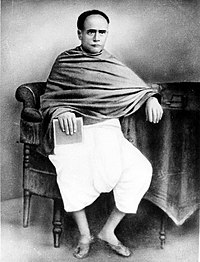|
Vikidia currently has 4,636 articles. Improve it! |
|
Join Vikidia: create your account now and improve it! |
Ishwar Chandra Vidyasagar
Ishwar Chandra Vidyasagar (26 September 1820 – 29 July 1891) was a prominent Indian reformer, scholar, educator, and philanthropist in the 19th century. His contributions to society spanned various fields, including education, social reform, and literature. Vidyasagar, a Sanskrit term meaning "Ocean of Knowledge," aptly reflects his vast and profound learning.
Early Life and Education:[edit | edit source]
Ishwar Chandra Vidyasagar was born in Birsingha village of Medinipur district in Bengal (present-day West Bengal, India). His early education took place in traditional Sanskrit schools, and he exhibited exceptional intelligence from a young age. He later pursued higher education at Sanskrit College in Calcutta (now Kolkata), where he mastered Sanskrit grammar, literature, philosophy, and the Vedas.
Educational Reforms:[edit | edit source]
One of Vidyasagar's most significant contributions was in the field of education. He played a crucial role in the development and promotion of the Bengali language and literature. Vidyasagar worked tirelessly to modernize the traditional education system, advocating for the use of the vernacular language and the inclusion of scientific and practical subjects.
In 1855, he became the principal of Sanskrit College, where he implemented various reforms, including the introduction of English as a medium of instruction. His efforts aimed to make education accessible to a broader section of society, breaking down the barriers of caste and gender.
Social Reforms:[edit | edit source]
Vidyasagar was a staunch advocate for social reform and worked towards eradicating prevalent social evils. He actively campaigned against practices like child marriage and advocated for the remarriage of widows, which was a radical idea in the conservative society of that time. His efforts led to the passage of the Widow Remarriage Act of 1856, a landmark legislation that allowed Hindu widows to remarry.
Literary Contributions:[edit | edit source]
Ishwar Chandra Vidyasagar was a prolific writer and contributed significantly to Bengali literature. His most notable work includes the Bengali primer "Barnaparichay," which simplified the learning of the Bengali alphabet and language for beginners. He also wrote extensively on various subjects, including philosophy, literature, and social issues.
